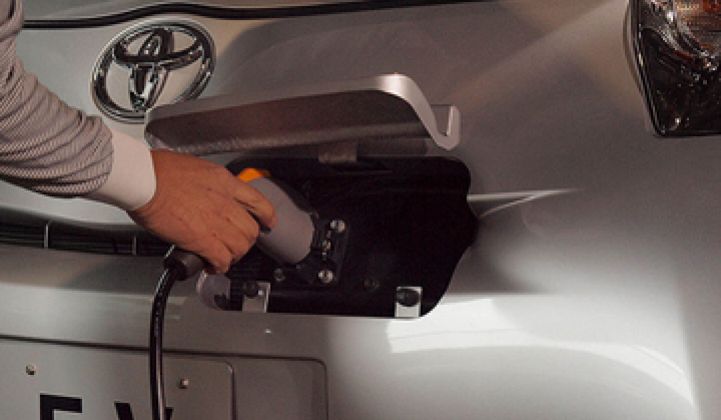ABB hosted its annual Western Utilities Executive Conference in Pebble Beach, California last week, hosting a panel that explored the future of electric vehicles (EVs) and the implications for utilities.
One of the main takeaways from the discussion was how the force of regulation is driving the EV industry in the U.S. Bob Feldmaier, a former chief engineer at both Chrysler and Telsa Motors, noted that new CAFÉ standards of 54.5 mpg by 2025 are forcing carmakers to pursue electric vehicles -- in addition to hybrids and plug-in hybrids -- because there is simply no way to achieve fleet-wide fuel efficiency at that level without them.
As CEO of ECOtality, a company that is building the world’s largest EV charging network (under the auspices of the DoE-sponsored EV Project), it’s perhaps predictable that Jonathan Read was the most sanguine of the group on the question of customer acceptance. However, he also related a few interesting findings from the EV Project. First, drivers were “topping up” their cars frequently, even after using only 30 percent of the battery’s capacity. This is perhaps a symptom of range anxiety, but it has implications for utilities because one of the key assumptions underlying smooth integration of many more EVs is the creation of incentives for drivers to charge their cars during off-peak hours. Another way of saying this is: get them not to charge on hot afternoons.
As Portland General Electric’s Charlie Allcock pointed out, though, the transition away from conventional gasoline engines will not rest on a single technology or a single application. He noted, for example, how commercial vehicles have an enormous impact in terms of fuel consumption and emissions. Long-haul trucking might be a harder sell, but it’s not difficult to envision a local delivery fleet converting to hybrids, EVs, or even natural-gas-powered vehicles.
In fact, the panel noted that CNG had the potential to compete with EVs, at least as a niche player. With the abundance of shale gas projected to keep prices in the $4 range for the foreseeable future, CNG has now overcome one of its major character flaws: price volatility. While the lack of a fueling infrastructure will probably prevent CNG from being used in passenger cars, it could very well prove to be a viable alternative for short-range commercial vehicle applications.
But clearly the main objective for the EV industry, which now includes every major car company as well as a number of new entrants, is the conquest of the passenger car market, or at least the establishment of a beachhead. All the panelists agreed that visions of vehicle-to-grid energy storage, for example, will not be fulfilled for at least another five years, and only after issues like voiding warranties and utility pricing structures get worked out.
Before that can happen, consumers will need to get more comfortable with EVs. David Areghini, Associate General Manager at Salt River Project, said that in a survey of SRP customers conducted recently, 28 percent of respondents said they were somewhat to very likely to purchase an electric vehicle in the next three years. However, respondents also reported concerns such as worrying about their car tripping breakers in their house and winding up with melted ice cream in the freezer and a dead battery in the garage.
Clearly, more needs to be done to understand exactly how people will use EVs before utilities can fine-tune their strategies for dealing with them. ECOtality is in a unique position to do just that through the EV Project, which according to Read has already racked up over 6 million miles of EV driving data, as well as some interesting anecdotal evidence. In addition to the topping-off phenomenon noted previously, Read noted that some of the Chevy Volt drivers in EV Project cities had begun competing with one another to see how long they could go without filling the fuel tank for the range-extender engine.
Whether or not EVs will be “successful” depends a lot on where you’re standing and how you define success. One thing is for sure, though -- the shape of success is likely to change no matter what your point of view.
***
Bob Fesmire is Strategic Communications Manager at ABB.



